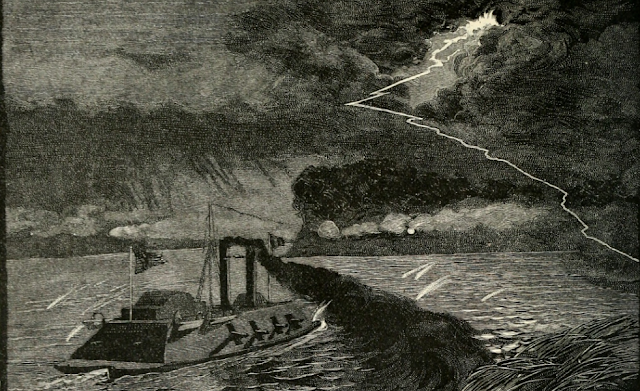Escape from the Island: An Arkansas Yankee and the Surrender of Island No. 10
Captain
Frederic W. Hoadley, a native of Connecticut serving as an Arkansas officer on detached
duty with the 1st Tennessee Heavy Artillery at Island No. 10, knew
the end was near when a Yankee gunboat thundered by and dismounted his pieces.
“We hit the boat but could do her no harm,” he stated. “That night another boat
passed the Island batteries and at daybreak both showered their balls upon our
dismounted batteries.” The next morning, Captain Hoadley was busy spiking his
guns when he noticed that a Federal landing party was heading for his position.
“We started on a run across an open cornfield under a severe fire from the
Minie muskets, the bullets of which whistled uncomfortably near our heads. Some
30 of them started to head us off, loading and firing as they ran, all the time
hallowing at us,” he reported.
A
week later, Captain Hoadley recalled his near escape to the readers of the Arkansas
True Democrat in Little Rock, Arkansas. A year later, then Major Hoadley
wouldn’t escape another Yankee trap at Vicksburg, being killed in action June
9, 1863.
Memphis, Tennessee
April 15, 1862
I presume that you are anxious to learn somewhat of the
officers and men of our company and of the misfortune which attended us at
Island No. 10. On Friday the 4th about 1 o’clock in the morning
during a terrific storm, one of the Yankee gunboats mounting 16 guns passed our
batteries at New Madrid. Our men were up all night at the guns and at daybreak,
wet, tired, and hungry, we were ordered to march without stopping for breakfast
and without encumbering ourselves with blankets or any baggage and take charge
of the batteries below New Madrid, a distance of 10 miles. We arrived at 2 p.m.
and found that the company would be compelled to be separated, some of them
being stationed at least two miles from the upper detachment.
 |
| The batteries at Island No. 10 prevented Union passage down the Mississippi River; but General John Pope's combined operation finally compelled the Confederates to abandon the position in April 1862. |
On Sunday, the boat [the U.S.S. Carondelet] steamed past our guns, firing at us as
it went while six batteries on the Missouri shore joined in the contest. As the
boat passed up again, we still continued to fire until our guns were
dismounted. We hit the boat but could do her no harm. That night another boat [the U.S.S. Pittsburgh] passed the Island batteries and at daybreak in the morning both showered their
balls upon our dismounted batteries while the guns from the land batteries
poured a continual fire of shrapnel upon us. Our men acted bravely.
Lieutenant
Baggett commanded the gun two miles below where I had stationed myself and
nobly stood his post until it was folly to remain longer. The enemy landed and
spiked his gun, and then passed up, shelling and spiking each battery above. I
sent Lieutenant Osborn off with all of the men from the upper gun except Conway
who remained with me to spike our gun and to set fire to the house containing
our baggage. We remained almost too long at our post for when I came out of the
house, the gunboats were lying in shore only 70 yards below and had landed
about 70 men. We started on a run across an open cornfield under a severe fire
from the Minie muskets, the bullets of which whistled uncomfortably near our
heads. Some 30 of them started to head us off, loading and firing as they ran,
all the time hallowing at us. They chased us a mile and a half.
 |
| Captain Daniel Turrentine of Co. G, 12th Arkansas Infantry |
As
soon as I got out into the road, I asked for Lieutenant Baggett and his
detachment and was informed that he had gone to Tiptonville, and I received
orders to do the same. Lieutenant Osborne and six or seven men got on a wagon
and when we got to Tiptonville, got separated from me. When I got into the road
after leaving the river, I found all of the infantry in full retreat for
Tiptonville, a total of five regiments. I remained at Tiptonville with eight
men until 9:30 p.m. waiting to pick up more of our men and only left when the
Yankee pickets fired upon us. We then got on a raft and floated down the
Mississippi River.
Lieutenant
Baggett instead of making his way to Tiptonville went back to our old camp on
the Island. He arrived here yesterday with 16 men, having crossed the lake. All
the heavy artillery companies except Hume’s, Angbird’s, and the Guerillas got
off. Lieutenant Osborne I think must be a prisoner. We leave this morning for
Fort Pillow. The Island was surrendered: we lost five regiments of infantry,
all of our guns, and ten brass pieces. I learned that the Yankee gunboats are
now at Fort Pillow and we go to pay them back. Colonel Gantt and his regiment [12th
Arkansas] and Colonel [Jabez M.] Smith of Benton with his regiment [11th
Arkansas] are among the prisoners. Lieutenant C. Watkins of Colonel Smith’s
regiment is among those taken. Colonel Terry’s battalion [4th
Arkansas] got away safe and are now at Fort Pillow. We lost 2,000 effective
men.
Yours truly,
Frederic W. Hoadley,
Captain of Co. H of the 1st Tennessee Heavy Artillery (formerly Co.
D, 4th Battalion, Arkansas Infantry)
Source:
Letter from Captain Frederic
William Hoadley, Arkansas True Democrat (Arkansas), April 24, 1862, pg.
2












Comments
Post a Comment